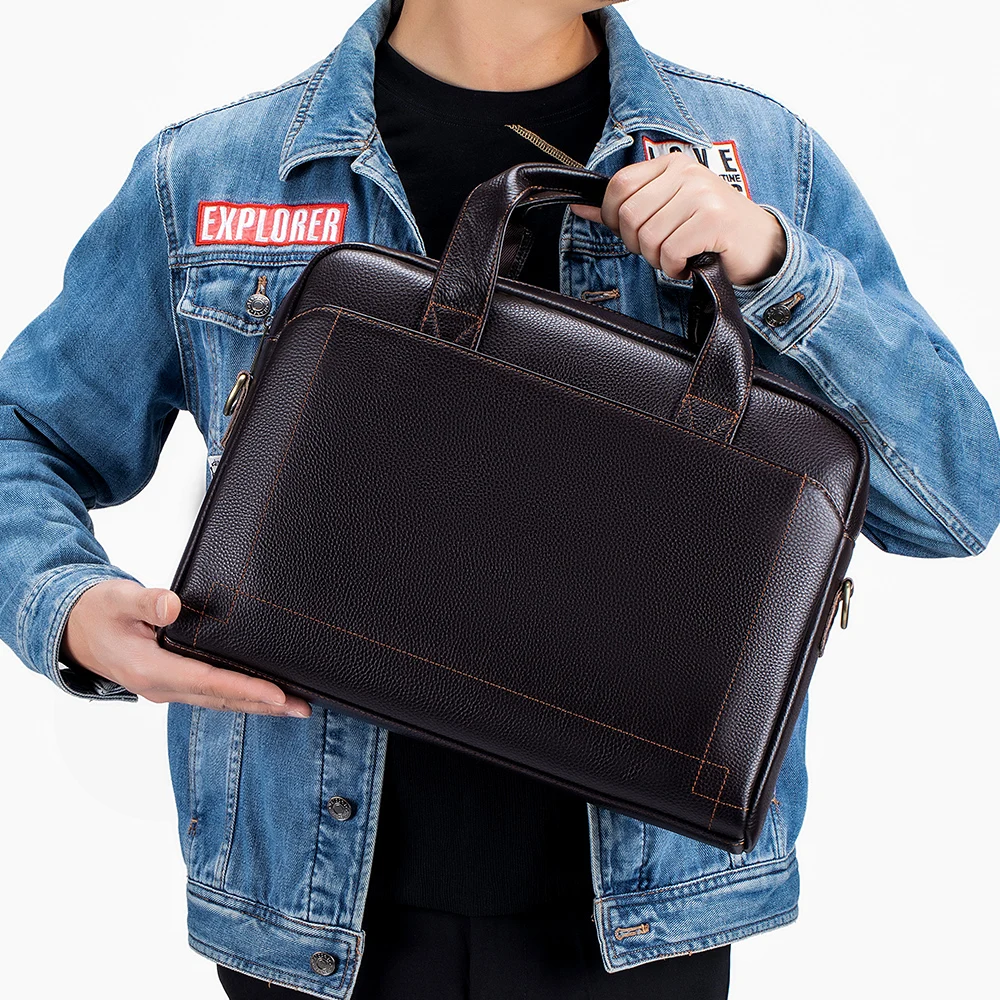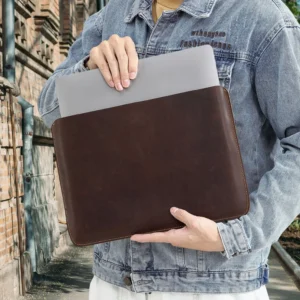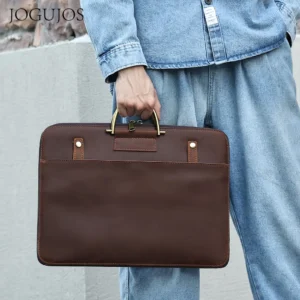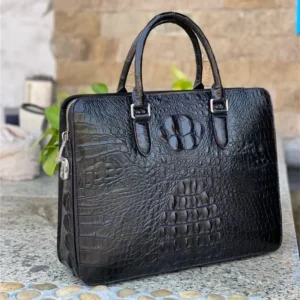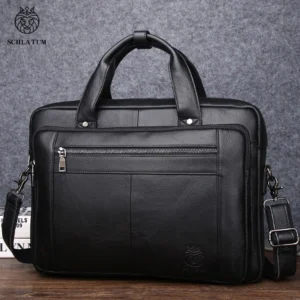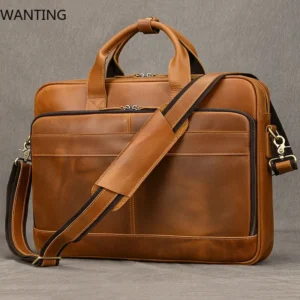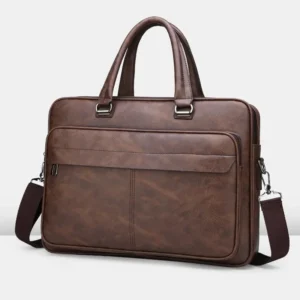Introduction: The Statement You Carry into Every Meeting
When you walk into a meeting, your leather briefcase makes a silent yet powerful statement about your professionalism long before you say a word. It’s not merely a container for your documents and devices—it’s an extension of your professional identity that signals preparation, attention to detail, and personal standards.
In today’s competitive business environment, the accessories you choose can significantly impact how colleagues, clients, and superiors perceive you. Research consistently shows that polished professional accessories contribute to positive first impressions and can even influence meeting outcomes.
This guide aims to navigate you through the essential considerations when selecting a leather briefcase specifically designed for meeting environments. We’ll explore quality construction markers, organizational features that enhance meeting productivity, and style elements that complement your professional image. Whether you’re giving presentations to clients or joining executive boardroom discussions, the right professional leather briefcase will serve both as a functional tool and as a reflection of your career commitment.
Remember, this isn’t simply a purchase—it’s an investment in your professional presentation that will accompany you through countless important conversations and career milestones.
Why a Quality Leather Briefcase Matters for Meeting Success
A quality leather briefcase transcends basic functionality to become a strategic professional asset. Its impact extends far beyond simply carrying your items from one meeting to another.
Professional Image Enhancement:
– Projects competence and attention to detail
– Communicates career seriousness and investment in your professional identity
– Sets a tone of preparation and organization before discussions begin
– Complements formal business attire, creating a cohesive professional appearance
Practical Meeting Functionality:
– Provides immediate access to documents when needed during discussions
– Organizes presentation materials in a logical, accessible manner
– Protects technology investments like laptops and tablets
– Eliminates fumbling for materials that can disrupt meeting flow
Psychological Advantage:
Studies in business psychology have demonstrated that professionals who feel properly equipped and organized exhibit greater confidence in high-stakes situations. Your briefcase serves as both physical and psychological preparation for important discussions.
Additionally, first impressions formed within seconds of meeting someone are disproportionately influenced by visual cues, including professional accessories. Whether you’re negotiating with potential clients or presenting to senior leadership, your briefcase subtly reinforces your credibility and professional standing.
The right briefcase doesn’t just house your meeting essentials—it helps elevate your overall professional image through leather accessories in ways that contribute directly to meeting outcomes and career progression.
Understanding Leather Quality: The Foundation of Excellence
The quality of leather used in your briefcase fundamentally determines its appearance, durability, and long-term value. Understanding the different grades and treatments helps ensure your investment meets professional standards.
Leather Grades Explained
| Grade | Characteristics | Durability | Aging Process |
|---|---|---|---|
| Full-grain | Natural surface with visible characteristics, tightest fiber structure | Exceptional | Develops rich patina, improves with age |
| Top-grain | Sanded surface, more uniform appearance | Very good | Moderate patina development |
| Genuine leather | Lower layers of hide, often painted or embossed | Fair | May crack or peel over time |
| Bonded leather | Reconstituted leather scraps | Poor | Deteriorates rather than improves |
Full-grain leather represents the highest quality available, featuring the outermost layer of the hide with its natural markings intact. While initially more expensive, its exceptional durability makes it more economical over time. The surface develops a beautiful patina—a natural luster that deepens with use—creating a distinctive, sophisticated appearance unique to the owner.
Top-grain leather offers an excellent balance between quality and consistency. The slight sanding process removes imperfections while preserving much of the leather’s natural strength. This grade provides good durability with a more uniform appearance than full-grain.
Tanning Methods Matter:
The process used to transform raw hides into finished leather significantly impacts quality:
- Vegetable tanning uses natural plant materials, resulting in firm leather with rich coloration and excellent aging properties—ideal for structured briefcases meant to last decades.
- Chrome tanning produces softer, more pliable leather available in a wider range of colors but may not develop the same distinguished patina.
When examining a potential briefcase, quality leather should feel substantial, with a pleasant natural aroma. Run your fingers across the surface—premium leather feels slightly textured, not perfectly smooth or plastic-like. The defining characteristics of best leather briefcases include material that breathes, absorbs minimal moisture, and shows subtle variations indicating natural origin.
Essential Construction Features: Building a Briefcase That Lasts
The finest leather can still result in a disappointing briefcase if construction quality doesn’t match the material excellence. Key structural elements determine whether your briefcase will maintain its functionality and appearance through years of meeting environments.
Superior Stitching Techniques:
– Look for tight, even stitching with no loose threads
– Double or reinforced stitching at stress points indicates durability
– Saddle stitching (where each stitch is independent) offers superior strength over machine lock stitching
– Stitches should be recessed slightly to prevent abrasion
Hardware That Withstands Daily Use:
– Solid brass or stainless steel hardware resists corrosion and maintains appearance
– Zippers should operate smoothly with no catching (YKK and RiRi are respected zipper manufacturers)
– Clasps and locks should engage firmly with precise alignment
– Hardware should be securely attached with reinforced mounting points
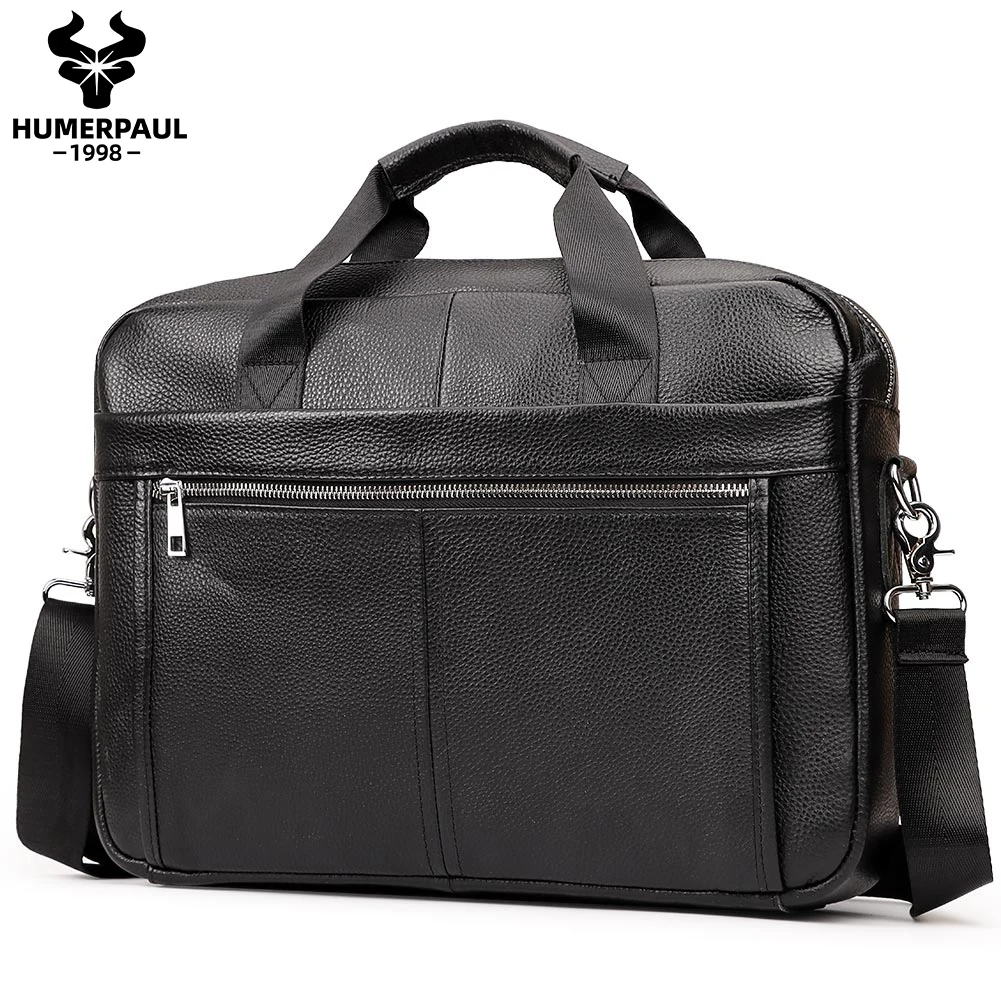
Critical Reinforcement Areas:
– Corner reinforcement prevents deformation at vulnerable points
– Bottom panels should include protective feet and additional structure
– Handle attachments require substantial reinforcement
– Strap connection points need robust support structures
Interior Construction Considerations:
– Lining material should be durable yet gentle on contents
– Piping along edges indicates attention to structural integrity
– Internal supports maintain shape when partially empty
– Edge finishing (burnishing or painting) prevents leather from fraying or separating
When assessing construction quality, pay special attention to bottom corners where stress accumulates. Gently flex the briefcase to check for appropriate stiffness—too rigid may crack over time while too flexible won’t adequately protect contents. The definitive guide to ideal leather briefcases emphasizes that excellence in construction is evident in the smallest details, from the symmetry of stitching to the smoothness of edge treatment.
Meeting-Optimized Organization: Interior Design That Works
The internal configuration of your briefcase directly impacts your meeting efficiency and professionalism. A thoughtfully designed interior transforms a simple carrying case into a strategic business tool.
Essential Compartmentalization:
– A dedicated laptop section with adequate padding (confirm exact dimensions match your device)
– Document compartment that maintains papers in pristine condition
– Accessible yet secure pocket for presentation materials
– Separate sections for digital accessories (chargers, adapters, drives)
Strategic Organization Features:
– Business card pocket positioned for smooth retrieval during introductions
– Pen loops placed for quick access without disruption
– Padded tablet sleeve that allows immediate device access
– Cable management system that prevents tangling and damage
Security Considerations:
– Interior zippered pocket for confidential materials
– RFID blocking pocket for access cards and digital security
– Secure closure mechanisms that prevent accidental opening
– Lockable sections for sensitive documents when appropriate
The ideal meeting briefcase balances capacity with profile—it should accommodate everything needed without appearing overstuffed or unwieldy. Standard letter/A4 documents should fit without folding, typically requiring a minimum interior dimension of 11.5 × 8.5 inches (29 × 22 cm).
Consider your specific meeting patterns: client presentations may require additional space for materials, while internal meetings might focus more on digital resources. Some professionals benefit from organized leather briefcases designed specifically for work settings that anticipate common needs like quick access to business cards during networking portions of meetings.
For those who regularly transition between presentation and discussion formats, adjustable or removable organizers provide valuable flexibility to reconfigure interior space based on meeting requirements.
Carrying Comfort: From Office to Boardroom
Even the most beautiful briefcase will become a burden if it causes discomfort during your professional day. Ergonomic considerations significantly impact both practical usability and your composed appearance in meetings.
Handle Design Essentials:
– Properly proportioned handles that fit comfortably in hand
– Adequate clearance between handle and case for easy grip
– Rolled or padded handles that distribute weight comfortably
– Proper balance point that prevents excessive swinging
Shoulder Strap Considerations:
– Removable design for formal settings where hand-carrying is preferred
– Adequate padding at pressure points to prevent shoulder strain
– Non-slip texturing to prevent shifting during commutes
– Adjustable length to accommodate different wearing positions and body types
Weight Management:
– Empty weight under 4 pounds (1.8 kg) for daily comfort
– Balanced distribution that prevents uneven loading
– Structural design that doesn’t add unnecessary bulk
– Material choices that provide protection without excessive weight
Travel-Friendly Features:
– Luggage strap for secure attachment to rolling suitcases
– Dimensions that comply with carry-on requirements
– Quick-access pockets for travel documents
– Durable construction that withstands transit handling
Regular transitions between carrying modes should be smooth and intuitive, allowing you to adjust your briefcase handling based on situation—from shoulder carry during commuting to elegant hand carry when entering meeting rooms. This versatility ensures you maintain professional composure regardless of how far you need to transport your meeting materials.
Professional Aesthetics: Aligning Style with Industry Standards
A briefcase’s visual design communicates subtle but significant messages about your professional identity and understanding of industry expectations. The aesthetic elements should align with both your personal style and your professional environment’s standards.
Classic vs. Contemporary Design Language:
– Traditional designs with structured silhouettes project established authority
– Contemporary styling with cleaner lines suggests modern thinking
– Hybrid approaches balance timeless elements with updated details
– Minimalist designs emphasize efficiency and forward-thinking
Strategic Color Selection:
– Black: Maximum formality and versatility across all professional settings
– Dark brown: Sophisticated warmth that pairs well with navy and grey suits
– Cognac/tan: Business casual environments or creative professions
– Burgundy/oxblood: Distinctive yet professional for those with established careers
Silhouette Considerations:
– Structured designs with rigid shapes suggest discipline and traditional values
– Soft-structured models offering slight flexibility balance formality with adaptability
– Slimmer profiles project modern efficiency
– The case depth should appear proportional to its width and height
Different professional contexts demand different aesthetic approaches. Legal and finance professionals typically benefit from more conservative, structured briefcases that reflect the precision and tradition of their fields. Creative industries allow greater flexibility with more distinctive designs and colors, while technology sectors often favor sleek, modern profiles that echo innovative thinking.
The right briefcase should visually complement your typical business attire, creating a cohesive professional presentation. When properly chosen, leather briefcases enhance your professional look by creating visual harmony between your accessories and clothing while reinforcing your attention to detail.
Five Essential Briefcase Styles for Different Meeting Scenarios
Different meeting contexts call for specialized briefcase designs that align with both functional requirements and appropriate professional presentation.
1. Traditional Flap-Over Briefcase
This classic design features a top flap that secures over the main compartment, often with lock closures. Its formal structure and traditional silhouette make it ideal for:
– High-level client presentations
– Formal board meetings
– Legal proceedings
– Financial industry meetings where tradition signals stability
2. Modern Attaché Case
With a structured rectangular shape and typically a combination or key lock, these sleek cases open fully from a hinged design:
– Executive-level meetings where presence matters
– Formal presentations with minimal materials
– Situations requiring heightened document security
– Environments where quick access to organized materials is essential
3. Dedicated Laptop Briefcase
Designed with modern technology as the priority, these feature enhanced padding and organization:
– Technology-focused meetings with digital presentations
– Consulting engagements requiring multiple devices
– Work environments with frequent office changes
– International business travel requiring technology protection
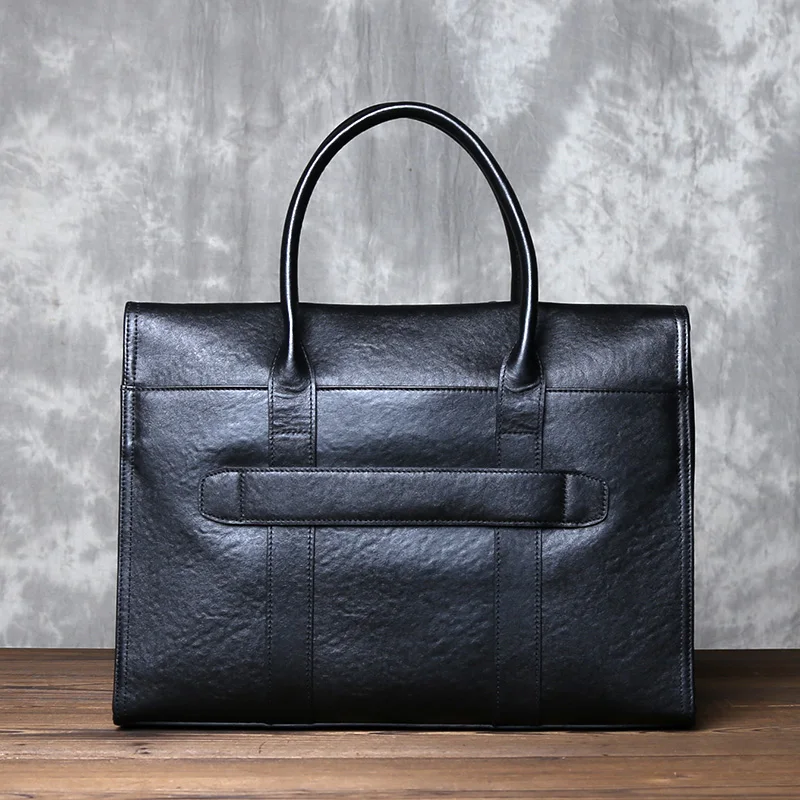
4. Portfolio/Document Case
Slim, lightweight designs with minimal compartmentalization:
– Short, focused meetings requiring few materials
– Situations where mobility and minimal bulk are priorities
– Complementing larger luggage for business travelers
– Creative presentations where elegance and simplicity matter
5. Convertible Briefcase
These versatile designs can transform between briefcase, messenger, and sometimes backpack formats:
– Mixed meeting schedules with varying formality levels
– Long commutes followed by client meetings
– Professionals who travel between multiple locations daily
– Situations requiring hands-free options between formal presentations
Each style evolved to address specific professional needs, and professionals still actively use briefcases despite the increasing digitalization of workplaces. The continued relevance of these designs reflects their practical advantages in organizing and protecting essential materials while maintaining appropriate professional presentation.
Value Versus Cost: Making a Wise Investment
Understanding the economics of quality leather briefcases helps transform the purchase from an expense into a strategic investment in your professional future.
The Long-Term Value Equation:
– Quality leather briefcases typically last 10-20+ years with proper care
– Lower-quality alternatives often require replacement every 2-3 years
– Cost-per-use calculations dramatically favor quality construction
– Repair possibility versus replacement necessity significantly impacts lifetime cost
Quality Justifies Premium Pricing:
– Superior materials cost manufacturers substantially more
– Skilled craftsmanship requires significant labor investment
– Hand-finishing and quality control add production time
– Proper construction techniques resist common failure points
Evaluating True Value Beyond Price:
– Durability metrics: stitching reinforcement, edge treatment, hardware quality
– Functionality benefits: protection effectiveness, organization efficiency
– Professional image enhancement: appropriate styling and quality signals
– Daily experience improvement: comfort, reliability, and convenience
When considering investment, examine the craftsmanship reputation behind the brand rather than simply the brand name itself. Some established manufacturers deliver exceptional quality that justifies their premium, while others rely primarily on marketing. Research the specific construction methods and materials used rather than brand prestige alone.
Remember that proper care dramatically extends lifespan—factoring maintenance products and occasional professional service into your total cost of ownership provides a more accurate value assessment. The classic leather briefcases that deliver the greatest professional value combine quality materials with time-tested construction techniques that resist both physical wear and style obsolescence.
Finding Excellence Across Price Points
Quality leather briefcases exist across various price ranges, with important distinctions in what each tier typically offers. Understanding these differences helps maximize value at your chosen investment level.
Entry-Level Quality ($150-300):
– Focus on simplified designs with fewer compartments
– Full-grain leather may be limited to touch points (handles, flap)
– Hardware typically good quality but less substantial
– Expect machine stitching rather than handwork
– May use leather-synthetic hybrid construction for structure
Look for clean stitching, secure hardware attachment, and consistent color/finish at this level. Compromises typically appear in the interior organization features and edge finishing quality.
Mid-Range Investment ($300-700):
– Full-grain leather throughout most or all exterior surfaces
– Substantial hardware with proper attachment techniques
– Reinforcement at stress points and corners
– Better interior organization with dedicated compartments
– Often includes features like padded laptop protection
This range typically represents the optimal balance between quality and value for most professionals. Construction should be genuinely durable with only minor compromises in leather thickness or handwork details.
Premium and Luxury Tier ($700+):
– Exceptional full-grain leather with careful selection
– Handcrafted details like saddle stitching and burnished edges
– Superior hardware often from specialized manufacturers
– Refined interior organization with premium materials
– Custom fitting for specific devices or purposes available
The most significant improvements at this level appear in leather quality, construction precision, and design refinement. The classic laptop briefcase options in this range typically feature proprietary design details and exceptional hardware.
Key Quality Compromises to Avoid at Any Price:
– Imprecise or irregular stitching that will fail under stress
– Unfinished edges that will fray or separate over time
– Plastic or lightweight metal hardware prone to breaking
– Insufficient reinforcement at handles and stress points
– Interiors that lack proper device protection
Your Decision Framework: Personal Assessment Checklist
To identify your ideal briefcase, systematically evaluate your specific professional needs against available options:
Meeting Environment Assessment:
– What level of formality characterizes your typical meetings?
– How conservative or progressive is your industry’s style standard?
– What impression do you specifically need to project?
– Are your meetings primarily internal, client-facing, or mixed?
Technical Requirements:
– Laptop size and protection needs?
– Typical document volume for daily meetings?
– Additional technology accessories requiring storage?
– Special items needed for your specific profession?
Usage Pattern Analysis:
– Daily commute method and distance?
– Frequency of transitions between locations?
– Weather conditions regularly encountered?
– Typical carrying duration throughout day?
Style Alignment:
– Current professional wardrobe color palette?
– Personal style preferences within professional boundaries?
– Career trajectory and image objectives?
– Industry-specific aesthetic expectations?
By methodically addressing these questions, you narrow options to those that specifically serve your professional context. The best briefcase for you optimizes this unique combination of needs rather than simply representing the highest price point or most features.
Common Selection Mistakes to Avoid
Even discerning professionals frequently encounter pitfalls when selecting a briefcase. Awareness of these common errors helps ensure your investment truly enhances your professional presence.
Style Without Substance:
Prioritizing attractive design without verifying fundamental quality markers often leads to premature failure. Aesthetics should complement—never replace—structural integrity and functional design.
Dimensional Miscalculations:
Failing to measure your actual documents and devices frequently results in frustrating fit issues. Verify that your laptop’s dimensions (including protruding features) fit comfortably in the designated compartment with adequate protection.
False Economy:
Compromising on leather quality to achieve a lower price point typically results in higher lifetime costs through premature replacement. Genuine quality leather improves with age rather than deteriorating.
Overlooking Meeting-Specific Features:
General-purpose briefcases may lack critical meeting functionality like silent hardware, accessible business card storage, or proper document organization. Consider your specific presentation needs.
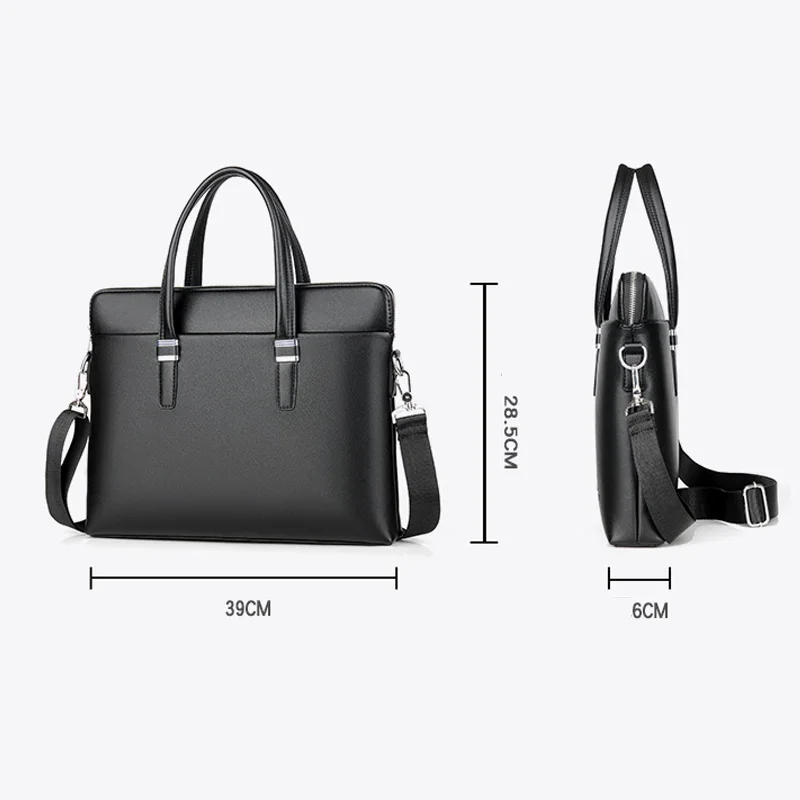
Ignoring Weight Considerations:
Excessively heavy briefcases quickly become burdensome regardless of their quality or appearance. Test the empty weight and consider your typical contents before committing.
The most successful briefcase selection balances professional appearance with practical functionality. Many classic leather briefcases for men address these potential issues through thoughtful design integration that anticipates professional needs.
Maintaining Your Investment: Essential Care
Proper maintenance dramatically extends your briefcase’s lifespan while preserving its professional appearance. A simple care routine protects your investment with minimal time commitment.
Regular Cleaning Protocol:
– Dust removal with soft cloth weekly
– Gentle cleaning with appropriate leather cleaner quarterly
– Immediate attention to spills or stains
– Periodic cleaning of hardware with soft cloth
Leather Conditioning:
– Apply quality leather conditioner 2-4 times annually
– Increase frequency in dry climates or with frequent use
– Focus on stress points and exposed areas
– Allow proper absorption time before use
Strategic Storage:
– Store upright when possible to maintain shape
– Use light stuffing to prevent collapse when not in use
– Avoid prolonged direct sunlight exposure
– Maintain adequate air circulation to prevent mildew
Addressing Common Issues:
– Treat minor scratches with appropriate leather balm
– Use specialized products for water spots
– Address loose stitching immediately before progression
– Clean interior periodically with fabric-appropriate methods
The proper maintenance of leather briefcases significantly impacts both appearance and longevity. Quality leather responds remarkably well to appropriate care, developing character and patina that enhances rather than diminishes its professional appearance over time.
Is a Leather Briefcase Always the Right Choice? Alternatives to Consider
While leather briefcases represent the traditional professional standard, alternative materials offer advantages in specific circumstances that merit consideration.
Ethical and Personal Preference Considerations:
For professionals with personal objections to animal products, high-quality synthetic alternatives increasingly offer comparable professional appearance without compromising values. Modern manufacturing techniques have significantly improved the aesthetic quality of non-leather options.
Environmental Conditions:
Extreme weather environments or outdoor work settings may better suit technical fabrics with enhanced water resistance and durability. Some professionals maintain both leather and technical options for different seasonal conditions.
Weight Sensitivity:
Those with physical limitations or extensive commutes might benefit from lightweight canvas or nylon briefcases that reduce carrying strain while maintaining professional organization.
Men's Classic Leather Briefcase, Slim Leather Laptop Briefcase, Slim Leather Portfolio Briefcase
$93.67 Select options This product has multiple variants. The options may be chosen on the product pageClassic Laptop Briefcase, Men's Classic Leather Briefcase, Slim Leather Attache Case
Price range: $353.50 through $360.81 Select options This product has multiple variants. The options may be chosen on the product pageBlack Leather Briefcase, Leather Document Bag, Men's Classic Leather Briefcase
Genuine Crocodile Leather Executive Briefcase with Password Lock – Premium Business Document Carrier$1,201.87 Select options This product has multiple variants. The options may be chosen on the product pageBlack Leather Briefcase, Classic Laptop Briefcase, Men's Classic Leather Briefcase, Slim Leather Laptop Briefcase
$228.72 Select options This product has multiple variants. The options may be chosen on the product pageBrown Leather Briefcase, Classic Laptop Briefcase, Crazy Horse Leather Satchel, Men's Classic Leather Briefcase
Price range: $172.15 through $200.02 Select options This product has multiple variants. The options may be chosen on the product pageMen's Slim Leather Briefcase, Slim Leather Laptop Briefcase, Vegan Leather Briefcase
Price range: $120.82 through $131.11 Select options This product has multiple variants. The options may be chosen on the product page
Portfolio Alternative:
For minimalist meeting needs, a simple portfolio might provide adequate functionality with reduced bulk. This option works particularly well for professionals who primarily use digital resources with minimal paper documents.
When considering alternatives, look for options specifically designed for professional contexts rather than casual messenger bags or general-purpose cases. The vegan leather briefcase options available today offer sophisticated styling that maintains professional appearance while addressing ethical considerations.
Ultimately, the right choice aligns with both your practical needs and your personal values while maintaining the professional presentation essential to meeting environments. Whether leather or alternative materials, quality construction and appropriate styling remain the fundamental requirements for a briefcase that enhances your professional presence.

